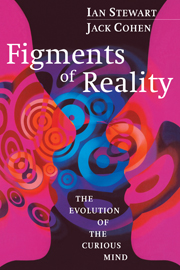Book contents
- Frontmatter
- Contents
- Preface
- Figure Acknowledgements
- Prologue
- 1 The Origins of Life
- 2 The Reductionist Nightmare
- 3 Ant Country
- 4 Winning Ways
- 5 Universals and Parochials
- 6 Neural Nests
- 7 Features Great and Small
- 8 What is it Like to be a Human?
- 9 We Wanted to Have a Chapter on Free Will, but We Decided not to, so Here It Is
- 10 Extelligence
- 11 Simplex, Complex, Multiplex
- Epilogue
- Notes
- Further Reading
- Index
9 - We Wanted to Have a Chapter on Free Will, but We Decided not to, so Here It Is
Published online by Cambridge University Press: 11 August 2009
- Frontmatter
- Contents
- Preface
- Figure Acknowledgements
- Prologue
- 1 The Origins of Life
- 2 The Reductionist Nightmare
- 3 Ant Country
- 4 Winning Ways
- 5 Universals and Parochials
- 6 Neural Nests
- 7 Features Great and Small
- 8 What is it Like to be a Human?
- 9 We Wanted to Have a Chapter on Free Will, but We Decided not to, so Here It Is
- 10 Extelligence
- 11 Simplex, Complex, Multiplex
- Epilogue
- Notes
- Further Reading
- Index
Summary
A senior Royal Air Force officer had organised an official reunion for World War II veterans, all in full dress uniform, covered in medals and ribbons, aged about seventy. The highlight of the event was a fly-past of restored aircraft - Spitfires, Lancaster bombers, and so on - and he stood in front of the veterans to watch them. Suddenly, sensing something odd, he turned round - to find that the veterans had disappeared. Then he realised that they were all lying flat on the grass. The explanation?
A Fokker (a WWII German fighter) had roared across the field, flying low …
‘It would be very singular,’ wrote Voltaire, ‘that all nature, all the planets, should obey eternal laws, and that there should be a little animal, five feet high, who, in contempt of these laws, could act as he pleased, solely according to his caprice.’ It is an eloquent statement of the problem of free will, and it is the place where our figments run slap up against reality, like the proverbial irresistible force meeting the immovable object. We have a distinct, overwhelming impression that we have a free choice concerning the actions that we take: free, that is, subject to the evident constraints of physical law. We cannot choose to float into the air, for example. Yet there is absolutely nothing in the inorganic world that possesses that kind of freedom.
- Type
- Chapter
- Information
- Figments of RealityThe Evolution of the Curious Mind, pp. 227 - 242Publisher: Cambridge University PressPrint publication year: 1997

